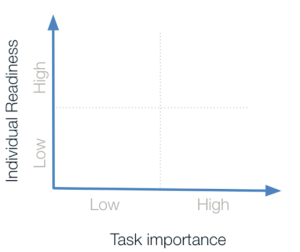If we are growing and more responsibilities are stacking on our plate, we often ponder which tasks we can delegate—and which ones will be harder than others. In times like these, we need to engage in this exercise: Importance vs. Readiness.
What is the Importance vs. Readiness Exercise?
Delegation is one of the most essential skills to master as a leader and one of the more challenging. Done well, it fundamentally impacts the culture, execution, and the bottom line. It creates inclusive leaders, flexible businesses, and fosters leadership in every seat within the organization.
When we try to delegate, sometimes it goes well; other times, it fails miserably. When it fails, we become hesitant to delegate again.
Delegation is not just about tossing “the thing that needs to get done” to someone. The art of delegation involves setting the task up for success from the outset. Am I assigning this to the right person? What is their readiness? How do we discuss their readiness? What context do they need to succeed?
The relational skills needed to lead well converge around delegation because it inherently involves a cooperative, relationship-driven dynamic. As leaders, we must not only assess our own capacity for delegation but also evaluate others’ capacity, and then invest in the relationships that will uphold the commitment.
Trust is a huge factor in this relationship. We need to trust that team members will understand the task at a high level and be able to execute it. If we lack the relational capacity to trust them and the trust that they will get the job done, then we will probably delegate poorly, or not at all.
Delegation done well also creates a record and a map for accountability, which can be used for managing up as well as managing your direct reports. In other words: if your leader is too busy to do this with you, you can ask for it. Not only does this foster leadership in every seat of the organization, but the process of documentation can be very supportive for everyone, including those with neurodivergence.
How to Use the Importance vs. Readiness Exercise
To start this exercise, think of a task or project that you want to delegate. Identify a person who might be able to complete the work. Use the graph below to plot them on the grid.

Then ask yourself these questions:
- How will you hand off the work to them?
- What context will you provide?
- What expectations will you set?
- What questions will you ask them to understand their readiness?
- When will you check in and provide feedback?
- How frequently?
- How will you connect it to their goals and motivations?
If done well, these questions will lead you to change your style and content of how you delegate these tasks. Hopefully, these changes will improve your outcomes, making delegation easier for you in your dental practice.
Be well and do well,
Addison Killeen
P.S. Ready to take your dental practice to the next level? Join the Dental Success Network today and connect with like-minded professionals who are transforming the way they do business.




